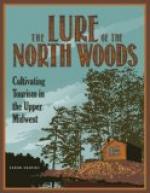When supper was over Thirlwell sat on one of the hearth-logs and lighted his pipe. Agatha was pleased that he did so. While they were in the bush their relations must be marked by an informal friendliness, as if she were a comrade and partner and not a girl. Anything that hinted at the difference in their sex must be avoided.
“You’ll get used to camp-life in a few days,” he remarked by and by. “At first I expect you’ll find it a change from, the cities. Things are rudimentary in the bush.”
“Nothing jars, except the mosquitoes,” Agatha replied. “I have no sense of strangeness; in fact, I feel as if I had been here before and belonged to the woods.”
“After, all, you do know something about them. I think you said you had camped in the timber.”
“That was different. It was a summer camp, organized by the railroad, and supplied with modern comforts. You bought a ticket and a gasolene launch took you up the lake. Then the men wore smart flannels and the girls new summer clothes. In the evenings one sang and played a banjo, another a mandolin.”
Thirlwell laughed. “You don’t like music?”
“I love it; but not ragtime and modern coon songs in the bush. No doubt the people who went there had earned a holiday, but it would have been different had they gone to fish or hunt. They went to loaf, play noisy games, and flirt. Indeed, I used to think we jarred as much as the horrible dump of old fruit and meat cans among the willows.”
“I think I know what you mean. Man makes ugly marks on the wilderness unless he goes to farm. A mine, for example, is remarkably unpicturesque.”
“But it stands for endeavor, for something useful done.”
“Not all mines. A number stand for wasted money.”
“And vanished hopes,” said Agatha. “Do you think I shall find the lode? I want you to be frank.”
Thirlwell hesitated. “On the whole, I don’t think so, but my judgment mayn’t be sound and my employer, Scott, does not agree. Anyway, I’ll help you all I can.”
For a moment or two Agatha studied him. His face was brown and rather thin and had a hint of quiet force; his easy pose was graceful but virile. Somehow he did not clash with the austerity of the woods; nor did the other men, who now sat, smoking, round the larger fire. Agatha liked their quietness, their slow, drawling speech and tranquil movements. She knew she could trust Thirlwell, but remembering a remark of Mabel Farnam’s, she asked herself why he had offered his help. She could find no satisfactory answer and thought it better to leave the puzzle alone.
“But you are doubtful,” she said. “Confidence is a strong driving force.”
“In a way, that’s true,” he agreed. “Still it sometimes drives you into mistakes, and when you get to work in the right way it doesn’t matter much if you’re confident or not. Your feelings can’t alter Nature’s laws. If you know how the vein dips, you can strike the ore; if you sink the shot-hole right, and use enough powder, you split the rock.”




